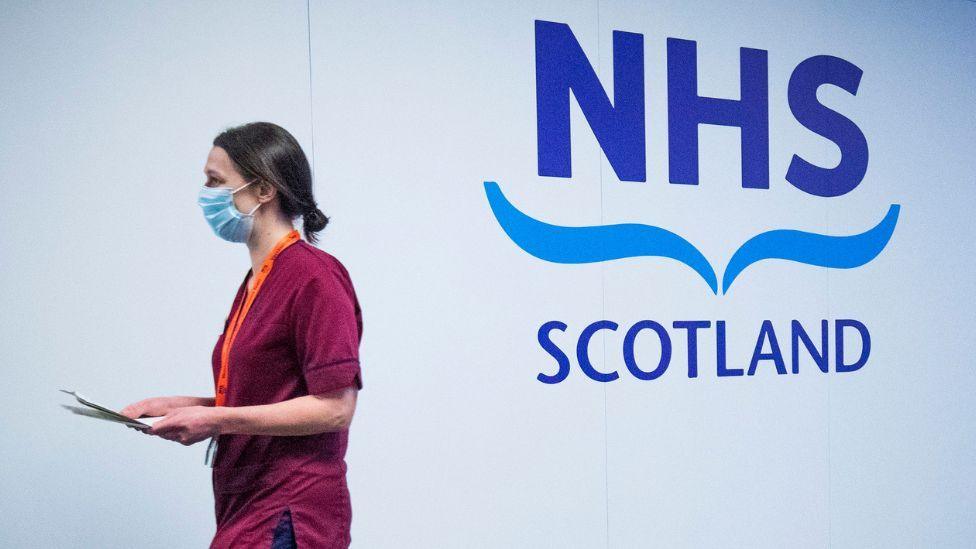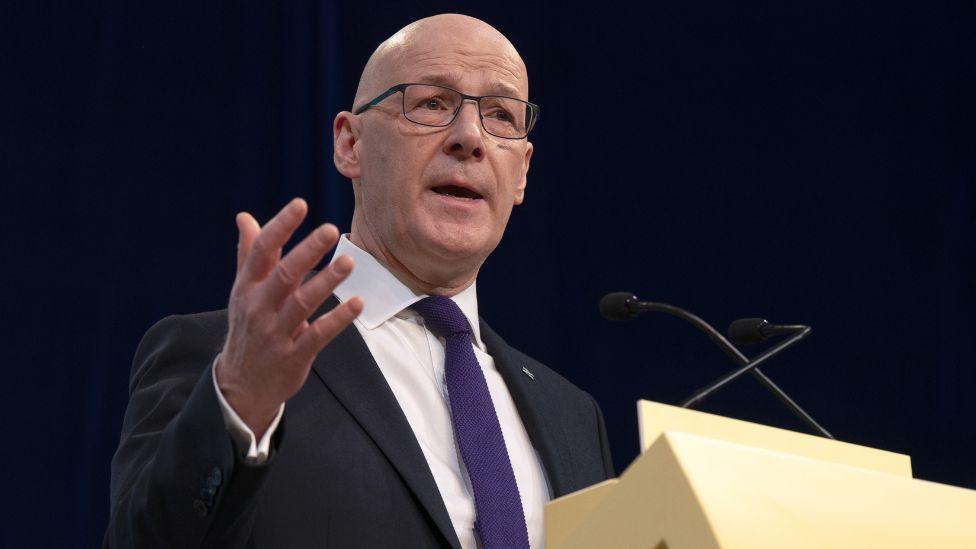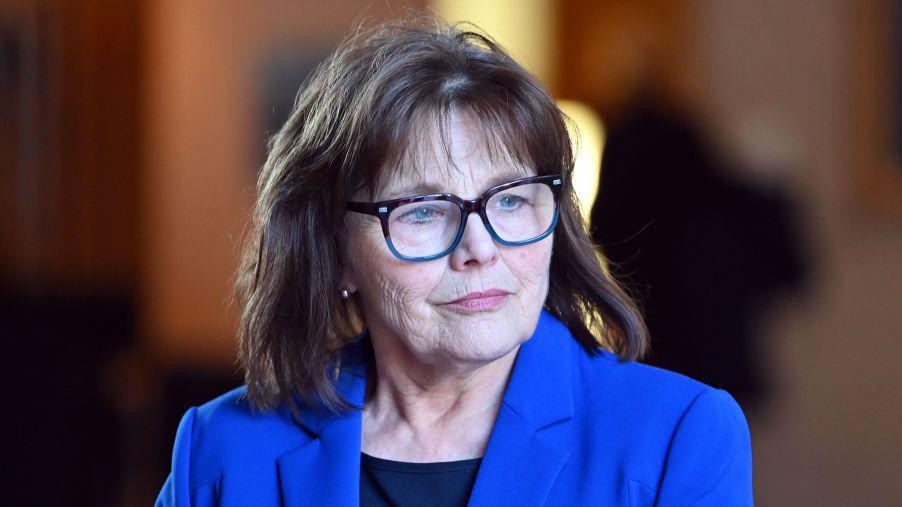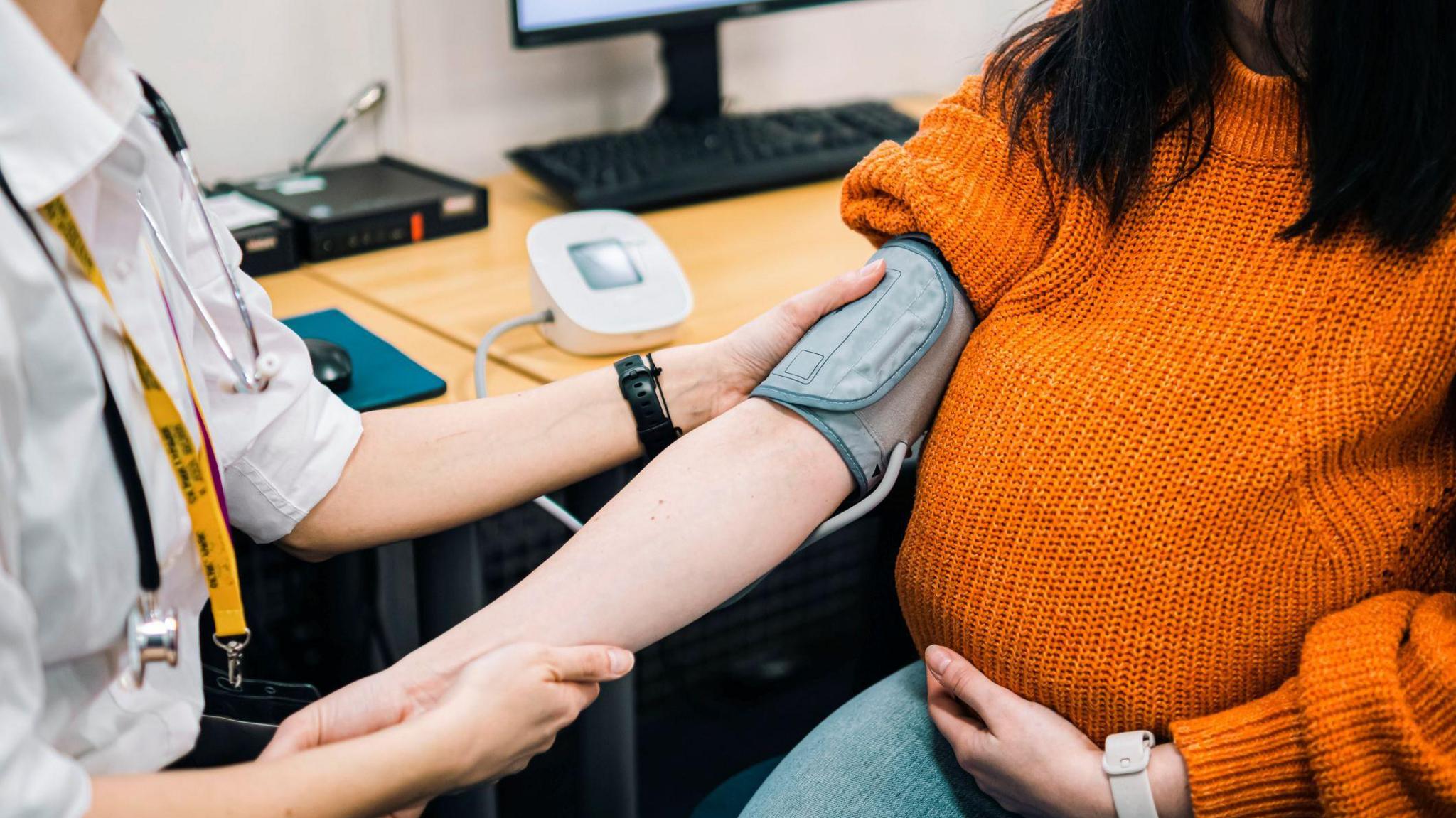Swinney pledges £25.5m to bring down NHS waits

A doctors union has claimed that NHS Scotland is "dying before our eyes"
- Published
The Scottish government has pledged £25.5m to help bring down NHS waiting times.
First Minister John Swinney said the money would help deliver more hospital appointments.
It is to be shared by nine health boards - Ayrshire and Arran, Fife, Grampian, Greater Glasgow and Clyde, Highland, Lanarkshire, Lothian, Shetland and Tayside.
The Scottish Conservatives said the £22.5m fund - out of a £22bn health and social care budget - would "barely touch the sides" of what was needed.
Scottish Labour said the government had a "disgraceful track record" on reducing waiting times.
The government said the money would go towards outpatient appointments, as well as increasing inpatient and day case procedures across a variety of specialities, including orthopaedics, dermatology, general surgery and gynaecology.
Cardiology and paediatrics will also get extra funding, the government said.
'Welcome improvements'
Swinney had already pledged £110m to cut NHS waits, with ministers aiming to end waits of more than a year by March.
The first minister told BBC Scotland News he was "optimistic" that the NHS had "turned a corner" on waiting lists.
"We're seeing increased levels of numbers of procedures and activity under way," he said.
"As a consequence of that we can be confident that the resources we're investing are being used effectively to reduce long waits."
Swinney added that some long waits were due to complex cases with with "legitimate" clinical issues.

John Swinney's government is planning to open walk-in GP services to tackle the "08:00 rush" for appointments
The number of Scots on waiting lists has fallen for four months in a row, dropping from 567,913 to 559,077 between August and September.
The number of year-long waits also dropped in the latest figures, from 60,864 to 56,439.
However, the number of waits of more than three years for outpatient treatment hit the highest on record, rising to 619.
The number of waits longer than two years for outpatient care also increased from 6,488 to 6,663.
Public Health Scotland - which publishes waiting list data - has warned that guidance introduced in July meant that waiting times were "not directly comparable" to periods before the change, which Scottish Labour claimed was an attempt to "fiddle the figures".
SNP will create network of walk-in GP services, says Swinney
- Published13 October
NHS Scotland waits of more than two years on the rise
- Published27 May
Last month, Swinney announced plans to set up walk-in GP centres to tackle the "the 08:00 rush for appointments".
The first minister pledged that the first of 15 sites planned initially would open by the end of the year.
However, leading doctors have questioned how the government plans to staff the centres.
The Scottish government announced an NHS improvement plan in March after after Audit Scotland said the ministers were unlikely to deliver on a pledge to deliver an additional 800 GPs by 2027.
The £200m plan included weekend appointments for scans, more use of digital technology and an expansion in hospital care at home.
The plan was the government's fifth in four years for health services.
'Agonising' waits
Scottish Conservative health spokesperson Dr Sandesh Gulhane said that frontline staff are at "breaking point" and pointed to thousands of Scots waiting over two years for treatment.
He said: "This sum will barely touch the sides when it comes to tackling these lengthy delays."
"Instead of tinkering round the edges, John Swinney needs to back our plans to cut red tape, reduce the number of middle managers and surge resources to the frontline."
Scottish Labour health spokesperson Jackie Baillie said: "It has been five years since the Scottish government met its own four-hour target on A&E waits, with thousands of Scots still having to endure agonising waits before being seen.
"Instead of addressing the problem, SNP ministers have shamefully attempted to pull the wool over the eyes of Scots by fiddling the figures in a desperate bid to cover up for their failure to take action."
Ahead of Swinney's announcement, the Royal College of Surgeons of Edinburgh urged the Scottish government to make greater use of national treatment centres to help reduce waiting times.
The centres were introduced following the pandemic to deliver extra appointments, diagnostic tests and surgeries. Four of the centres - in Clydebank, Kirkcaldy, Inverness and Larbert - are open but plans for five more have been put on hold due to funding concerns.
The royal college's president, Professor Rowan Parks, told BBC Radio's Good Morning Scotland that he would "love" to see the further centres go ahead, adding that they could be a way of "planning in advance and particularly tackling high volume cases, lower complexity" treatments.
Prof Parks said that in the long-term, "there needs to be redesign and renewal of the way in which services are delivered".
That came after former health secretary Jeanne Freeman said the current state of the NHS in Scotland was due to failures by successive governments – including her own.
She said that politicians had failed to take a long-term view of improving the health service beyond the next election, and that "politics gets in the way" of governments seeking the views of NHS staff.

It's not the first time the Scottish government has promised to end the longest waits.
In 2022, former First Minister Humza Yousaf said waits of over a year would be eradicated by September 2024 and that a network of National Treatment Centres would increase capacity for planned care.
Fast forward to today and only half of the National Treatment Centres commissioned have opened and waits of over a year have risen to 86,000.
The first minister is confident this time the money targeted at reducing waits is making a difference.
He says they have increased the number of appointments and operations and already the data is showing a reduction in waits of over 52 weeks.
Building on that will be a challenge for health boards as we head into winter.
If too many people are admitted with flu and other illnesses, it reduces the number of available beds for planned operations.
And there is also the question of resident doctors, formerly called junior doctors. They are soon to open a ballot for industrial action following a breakdown in talks over pay.
There is a possibility that a major part of the medical workforce could be on strike just as the NHS is trying to get through its most difficult months.

Related topics
- Published2 November

- Published14 October
